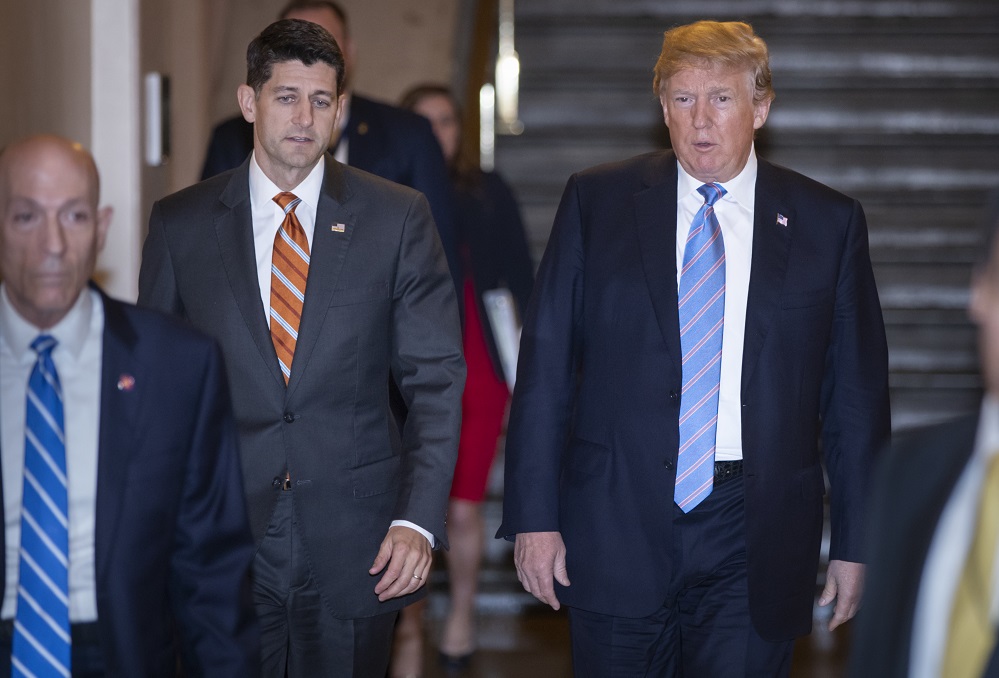
As the immigration problem has exploded with Donald Trump‘s policy of separating children from their parents who enter the United States illegally, Speaker Paul Ryan is struggling to pass any form of immigration bill.
Ryan is pushing ahead with votes on rival House GOP immigration bills, but neither appears to have enough support for passage, forcing the Trump administration to consider executive action to stem the crisis of family separations at the border.
President Donald Trump has said he’s “1,000 percent” behind both GOP bills, but restive House Republicans have all but begged GOP leaders for more clarity about what the president would actually sign. Public outcry is mounting over the family separations, but so far, there’s no clear roadmap for Thursday voting on the emotional issue dividing Republicans.
With the immigration bills teetering in the House, the White House launched an eleventh-hour push to try to bring Republicans onboard.
A group of wavering lawmakers was sent to the White House to meet with Trump in hopes he can persuade them, confirmed the office of Rep. Steve Scalise, the GOP whip. Back on Capitol Hill, Homeland Security Secretary Kirstjen Nielsen was set to meet with a larger group of House Republicans.
But congressional action remains uncertain. Facing condemnation of the family separations from across the political spectrum, the White House appeared poised to step in. Trump told reporters at the White House on Wednesday that he would be “signing something” shortly on the family separations. Nielsen has drafted an executive action directing her department to keep families together after they are detained crossing the border illegally.
More than 2,300 children were separated from their families at the border from May 5 through June 9, according to DHS.
Under the administration’s current policy, all unlawful crossings are referred for prosecution — a process that moves adults to the custody of the U.S. Marshals Service and sends many children to facilities run by the Department of Health and Human Services. Under the Obama administration, such families were usually referred for civil deportation proceedings, not requiring separation.
Ryan told reporters he prefers to see parents and children detained together in custody, as the GOP bills provide.
“We do not want children taken away from their parents. We can enforce our immigration laws without breaking families apart. The administration says it wants Congress to act and we are. Tomorrow, the House will vote on legislation to keep families together,” he told reporters Wednesday.
Asked by CBS News’ Nancy Cordes if Republicans were using detained children at the border as leverage to pass legislation, Ryan called the assertion “ridiculous.”
“We don’t think people should be separated at the border, but we should also not make the government have to choose between whether to support the law, secure the border and keep it intact, they ought to do all those things, that’s why were having a vote on this tomorrow,” he said.
As Republicans met privately Wednesday, House Democrats brought about two dozen immigrant children to the chamber floor in an unusual morning protest that defied House rules as they condemned the separation of families at the border.
Democrats said the images of children being held in cages in border facilities, some crying for their parents, would be a moment remembered in U.S. history. Rep. Luis Gutierrez, D-Ill., said Americans were “standing up for children, standing up for those who are in need.”
As Gutierrez spoke, his microphone was cut off because the gathering in the chamber was considered a breach of decorum. Presiding Rep. Liz Cheney, R-Wyo., gaveled the House to order.
GOP lawmakers, increasingly fearful of voter backlash in November, are struggling to find a way out of the problem created by the Trump administration’s policy of putting all immigrants who cross the border in criminal, rather than civil, proceedings that result in family separations.
Many want more clarity from Trump before giving their backing to the broader immigration bills, which also offer different remedies for other provisions on protecting “Dreamer” immigrants from deportation and funding for Trump’s border wall.
“Some of the members wanted to make sure the president is very visible in his support for both bills,” said Rep. Mark Walker, R-N.C., the chairman of the conservative Republican Study Committee, which makes up more than half the GOP majority.
Walker said several lawmakers remained undecided, denying leadership of the majority needed for passage. They want to see Trump’s support “constantly as we move forward — that he’s out there vocally supporting what he believes is the best pathway forward,” Walker said.
Even if Republicans manage to pass an immigration bill through the House, the fight is all but certain to fizzle in the Senate.
Sen. Chuck Schumer, the Democratic leader from New York, is adamant that Trump can end the family separations on his own and that legislation is not needed. Schumer said with most Americans against family separations, it’s Republicans “feeling the heat on this issue, and that’s why they’re squirming.” Without Democratic support, Republicans cannot muster the 60 votes needed to move forward on legislation.
In the House, a major change unveiled Tuesday would loosen rules that now limit the amount of time minors can be held to 20 days. Instead, the children could be detained indefinitely with their parents.
The revision would also give DHS the authority to use $7 billion in border technology funding to pay for family detention centers.
In the Senate, meanwhile, Republicans are rallying behind a different approach. Theirs is narrow legislation proposed by Sen. Ted Cruz, R-Texas, that would allow detained families to stay together in custody while expediting their hearings and possible deportation proceedings.
If Trump takes executive action, senators said they might reassess their legislative plans.
“It would certainly take the air out of the urgency. But depending on what it does, we have to wait and see,” said Sen. Marco Rubio, R-Fla., referring to a Trump directive.

